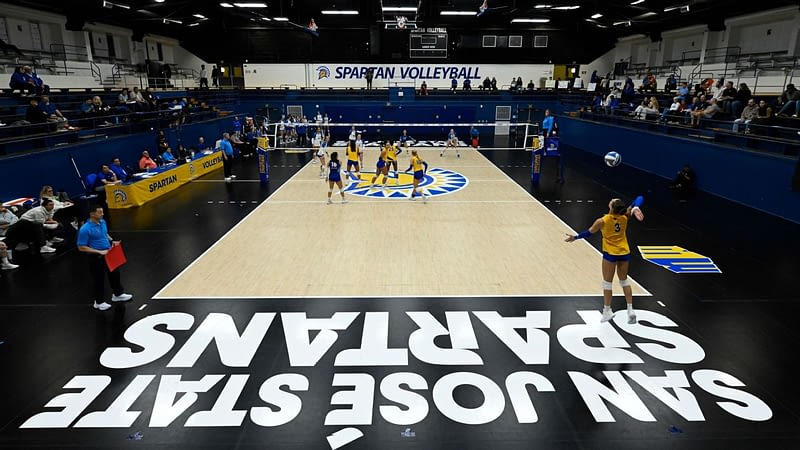Inside San Jose State’s Polarizing Volleyball Season: A Clash of Fairness, Safety, and Inclusion
Riley Gaines stepped onto the stage at the Reno-Sparks Convention Center, her black T-shirt emblazoned with the bold statement “XX ≠ XY” in white letters. The former University of Kentucky swimmer had traveled across the country to stand in solidarity with nine Nevada women’s volleyball players. These athletes were there to explain why they had refused to play against San Jose State, a team they claim includes a transgender player.
The event, organized by the Independent Council on Women’s Sports (ICONS), was initially set to take place in a college bar but was moved to the convention center to accommodate a crowd of about 400 people. Among the attendees were Nevada Senate candidate Sam Brown and Lt. Gov. Stavros Anthony, who was scheduled to speak. The atmosphere was charged, with attendees waving signs that read “Protect Women’s Sports” and “I Stand with Nevada Volleyball.”
Gaines invited the Nevada volleyball players, all wearing black “BOYcott” T-shirts, to join her on stage. Nevada captain Sia Liilii took the microphone, visibly emotional as she addressed the crowd.
“I never expected to be blindsided, having to compete against a male athlete,” Liilii said, wiping away tears. “When the news broke, I was stunned, as many of my teammates were. This is not what we signed up for.”
Liilii’s words echoed sentiments shared by players across the Mountain West Conference and even within San Jose State’s own locker room. The controversy surrounding the Spartans has sparked lawsuits, Title IX complaints, and a national debate about the inclusion of transgender athletes in women’s sports. Despite the turmoil, San Jose State continues to play whenever they can find opponents willing to face them—a task that has become increasingly difficult.
The Growing Divide
San Jose State has become a flashpoint in a broader cultural and political debate. The controversy began before the 2024 season when the news website Reduxx published an article alleging that a transgender player was on the Spartans’ roster. The athlete in question has not commented publicly, and San Jose State has cited federal privacy laws in declining to confirm or deny her identity. However, the school has maintained that all its athletes meet NCAA eligibility requirements.
For three seasons, the player competed without public outcry. But this year, her participation has become a lightning rod for criticism, with multiple lawsuits and even the president-elect weighing in. The debate has reached a fever pitch, with 25 states now enacting legislation restricting transgender women from participating in women’s sports, up from just nine states in 2021.
One of the most vocal critics has been Brooke Slusser, a co-captain of the San Jose State team. Slusser has joined two lawsuits arguing that her teammate should be ineligible to play. She has also filed a Title IX complaint against her head coach, Todd Kress, alleging that he failed to address safety concerns. Slusser’s actions have created a rift within the team, with players now divided over the issue.
Forfeits and Fallout
The controversy has had tangible consequences for San Jose State’s season. Nevada is the fifth team to refuse to play the Spartans this year, joining Boise State, Wyoming, Utah State, and Southern Utah. None of the schools have explicitly cited the transgender player as the reason for their forfeits, but the message from players like Liilii is clear: “Men do not belong in women’s sports.”
These forfeits have impacted the Mountain West standings, with San Jose State benefiting from automatic wins. The Spartans are now the No. 2 seed in the conference tournament, despite playing fewer games than their competitors. Meanwhile, the debate over fairness and safety continues to rage on social media and in courtrooms.
Safety Concerns or Exaggeration?
Critics of the San Jose State player argue that her participation poses a safety risk. In lawsuits, she is said to hit the ball at speeds of up to 80 mph, a claim that would place her among the hardest-hitting men’s volleyball players in history. However, ESPN’s analysis of game footage estimated her average spike speed at 50.6 mph, with a maximum of 64 mph—comparable to other top women’s players.
Former Nebraska coach Terry Pettit, who has seen the player compete, believes her power has been exaggerated. “She happens to be the kill leader on the team,” Pettit said. “But to think that she’s hitting any harder than people in the top-10 volleyball teams in the country, that’s not the case.”
Other players and coaches have echoed this sentiment, pointing out that male practice players and coaches often hit harder than any women’s player. “At the end of the day, all these top-25, top-50 big-time programs have male practice players,” said Michigan State outside hitter Akasha Anderson. “If we’re talking about danger, I feel like that’s not a fair argument to make in this situation.”
The Bigger Picture
The debate over transgender athletes in women’s sports is part of a larger cultural and political battle. Title IX, the landmark legislation that prohibits sex-based discrimination in education, has become a focal point in this fight. Advocates for restrictive policies argue that allowing transgender women to compete undermines the integrity of women’s sports. Opponents counter that such policies are discriminatory and fail to account for the complexities of gender identity.
According to Gallup, public support for transgender athletes competing in sports that align with their gender identity has declined in recent years, from 34% in 2021 to 26% in 2023. This shift reflects the growing polarization around the issue, with high-profile figures like president-elect Donald Trump calling for outright bans on transgender participation in women’s sports.
What’s Next?
As the Mountain West tournament approaches, the focus will shift back to the court—at least temporarily. San Jose State’s senior day victory over Colorado State showcased the team’s resilience in the face of unprecedented scrutiny. But the underlying tensions remain, both within the team and in the broader sports community.
For now, the Spartans will continue to play, and the debate over fairness, safety, and inclusion will continue to unfold. Whether the next chapter is written in a courtroom, a state legislature, or on the volleyball court, one thing is certain: this is a story that’s far from over.
Originally Written by: Katie Barnes





















